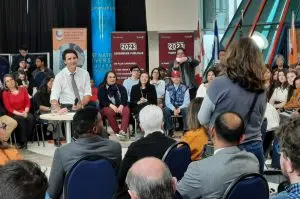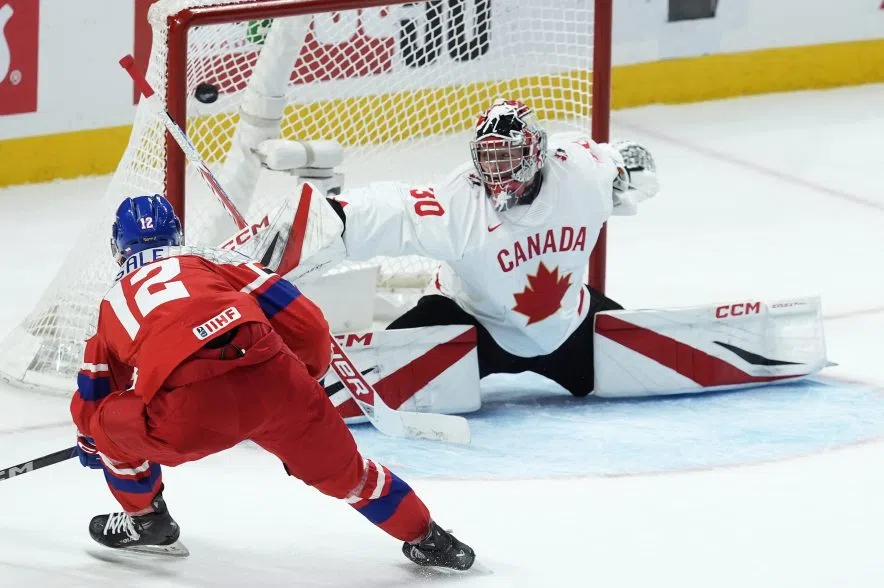In his short visit to Regina Thursday, Prime Minister Justin Trudeau capped things off with a stop at the First Nations University of Canada for a public town hall.
About 100 people sat in a circle around the prime minister, watching and listening as he took about a dozen questions from around the room.
The questions ranged from how parents could pay for programs for their kids to what the federal government can do about inner city poverty and asking why Trudeau’s government isn’t doing more to help with the problems of Missing and Murdered Indigenous Women and Girls.
Trudeau took his time on each question – the town hall lasted about two hours in total – but not everyone was happy with the answers.
Tammy Ratt is a PhD student at the FNUC, studying education and language revitalization. She asked the prime minister about doing the work to make Indigenous languages official languages of Canada, like English and French.
In his answer, Trudeau spoke about French and early settlers, reconciliation, and Bill C-91, the Indigenous Languages Act.
But after hearing from Trudeau, Ratt said she didn’t feel like he’d really answered her question.
“I don’t think he’s doing anything to make Indigenous languages official languages,” said Ratt.
After listening to other answers from Trudeau, Ratt said she didn’t like all of them. She said she wasn’t happy with some of the comments Trudeau made during the town hall, like answering a woman’s question about the federal government encroaching on provincial jurisdiction by saying he was flattered she thought he had the power to do that.

Prime Minister Justin Trudeau is asked a question at a budget town hall at the First Nations University of Canada. Apr. 13 2023 (Lisa Schick/980 CJME)
“I thought that was mean. I thought that was arrogant,” said Ratt.
Ratt said she likes Trudeau as a leader, but said more needs to be done.
Jayna Amadasun asked about the federal government stepping in to create an easier pipeline for foreign health-care workers to get their papers and start practising here. She got her medical training in the Dominican Republic, but said she found it incredibly difficult to be able to practise in Canada when she arrived.
In response, Trudeau spoke about provincial jurisdiction and the bilateral agreements his government has been making with the provinces around health care.
“The answer, I think, is kind of typical of the political atmosphere, but I think they have done a lot. They’re looking into something. They’re making change,” said Amadasun about the answer.
She said she believes Trudeau was willing to hear people out, which is something not all politicians do.
Several of the questions referred to areas which are under the jurisdiction of the provincial government, including health care, education, natural resources revenue, and working with the cities on housing. Trudeau said it felt like the elephant in the room.
The prime minister spoke about his positive dealings with the provincial government, including working on the $10-a-day daycare program and the recent changes to health-care funding. But he also talked about some problems the federal government has had with conservative provincial governments in the past, like getting them to accept money or use it in the intended place.
Trudeau noted he wasn’t picking on Premier Scott Moe in particular, mentioning that he’s seen similar issues with Ontario Premier Doug Ford and former Manitoba Premier Brian Pallister.
The prime minister also got political, mentioning multiple times that Saskatchewan doesn’t have any direct representation within the Liberal Party of Canada and the sitting government in Ottawa.
“That’s a choice that Saskatchewanians have made to not have anyone in the federal government. I really hope that turns around, because when it comes to delivering things for Saskatchewan, you deserve to have a voice in different parties to speak up for you,” said Trudeau.
He mentioned the issue again in a later answer, noting that Saskatchewan used to have Regina MP Ralph Goodale as a voice in the Liberal Party.
“If you had an MP to fight for you, to make sure that you were listened to, you would be able to make sure your voice was stronger,” said Trudeau.
“The values and the perspective that you have here aren’t always being very well represented by the folks that actually represent you as a monolithic block in Ottawa right now.”







